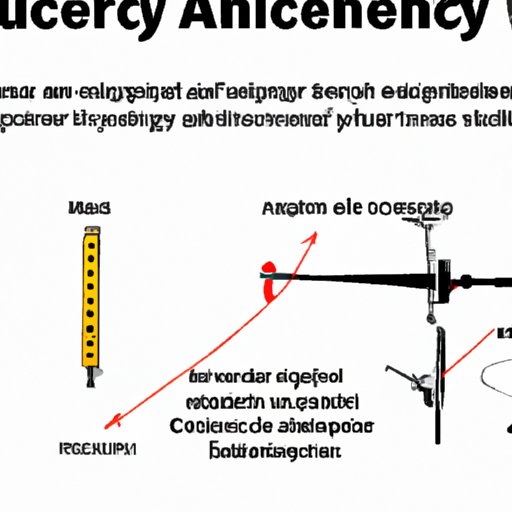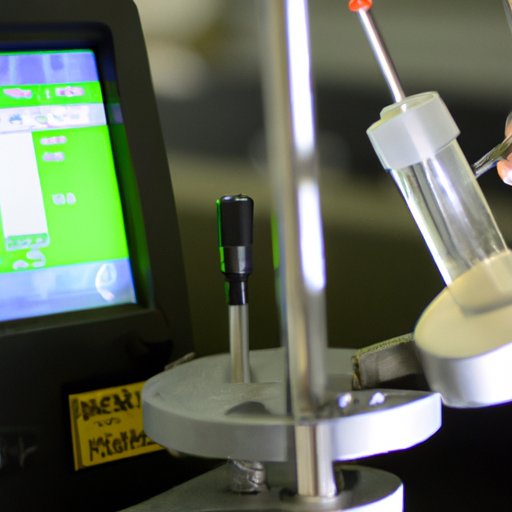Introduction
Accuracy is an important concept in science. It refers to how close a measurement is to its true value. In order for scientists to draw meaningful conclusions from their research, they must ensure that their measurements are as accurate as possible. But what does accuracy mean in science? In this article, we will explore the concept of accuracy in science and discuss how to achieve it.

What Accuracy Means in Scientific Research
Accuracy is vital for scientific research. Without accurate measurements, scientists would not be able to draw reliable conclusions about the world around us. To understand accuracy in science, we must first understand the importance of accurate measurements.
The Importance of Accurate Measurements
In science, accuracy is key to obtaining reliable results. When making measurements, it is not enough to simply be “close” to the true value. For example, if a scientist were measuring the temperature of a room, they would want to be sure that the reading is as close to the actual temperature as possible. If the measurement is too far off, then the data will be inaccurate and the results of the experiment could be skewed.
How to Ensure Accurate Results
To ensure accurate results, scientists must use precise instruments and techniques. They should also be aware of any potential sources of error that may affect their measurements. For example, if a scientist is measuring the weight of an object, they should make sure that the scales they are using are calibrated correctly. Additionally, they should account for any environmental factors such as air pressure or humidity that could potentially affect the accuracy of their measurements.
The Role of Accuracy in the Scientific Method
Accuracy plays a key role in the scientific method. Before any experiments can take place, scientists must ensure that their measurements are accurate. The following sections discuss how accuracy can be achieved in scientific experiments.
Steps for Ensuring Accuracy in Experiments
When conducting experiments, scientists should take the following steps to ensure accuracy:
- Calibrate instruments before use.
- Conduct multiple trials to reduce the effects of random errors.
- Double-check results against known values.
- Ensure that all variables are controlled and accounted for.
Guidelines for Collecting Accurate Data
In addition to taking steps to ensure accuracy in experiments, scientists must also follow certain guidelines when collecting data. These include:
- Making observations without bias.
- Using standard units of measurement.
- Recording data accurately and completely.
- Checking data for accuracy and completeness.
- Analyzing data objectively.

A Guide to Understanding Accuracy in Scientific Measurements
Accuracy is an important factor in scientific measurements. To understand accuracy, we must first look at the different types of accuracy and the factors that affect it.
Different Types of Measurement Accuracy
There are two types of accuracy in scientific measurements: absolute accuracy and relative accuracy. Absolute accuracy refers to how close a measurement is to its true value. Relative accuracy, on the other hand, refers to how close a measurement is to another measurement of the same quantity.
Factors Affecting Measurement Accuracy
Several factors can affect the accuracy of scientific measurements. These include:
- Instrument precision: The precision of the instrument used to make the measurement.
- Environmental conditions: External factors such as temperature, humidity, and air pressure can affect the accuracy of measurements.
- Human error: Poor technique or mistakes made while taking measurements can lead to inaccurate results.
Conclusion
Accuracy is an essential part of scientific research. To ensure accurate results, scientists must take steps to ensure accuracy in their experiments and follow certain guidelines when collecting data. Additionally, they must understand the different types of accuracy and the factors that affect it. By understanding and implementing these concepts, scientists can ensure that their measurements are as accurate as possible.
Summary of Key Points
Accuracy is a critical concept in science. To ensure accurate results, scientists must use precise instruments and techniques, calibrate instruments before use, conduct multiple trials, double-check results, and control and account for all variables. Additionally, they must understand the different types of accuracy and the factors that affect it.
Final Thoughts on Accuracy in Science
Accuracy is an essential part of scientific research. By understanding and implementing the concepts discussed in this article, scientists can ensure that their measurements are as accurate as possible. As Dr. Robert A. Millikan once said, “Accuracy is to science what honesty is to merchants.”
(Note: Is this article not meeting your expectations? Do you have knowledge or insights to share? Unlock new opportunities and expand your reach by joining our authors team. Click Registration to join us and share your expertise with our readers.)
